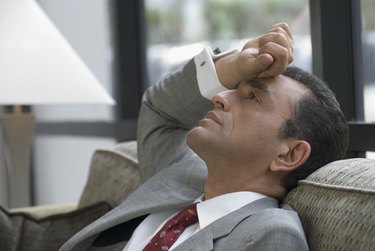
Epileptic seizures have three phases. The preictal phase is the time leading up to the seizure. The ictal phase is the seizure itself. The postictal phase is the period after the seizure. The postictal phase may last from seconds to days, depending on the type of seizure. Several types of symptoms are associated with the postictal period, especially after a generalized seizure. Postictal symptoms are temporary and typically require no treatment.
Video of the Day
Headache
Headache is a common symptom after an epileptic seizure. Postictal headaches frequently occur after generalized seizures and complex partial seizures. They occur less frequently after simple partial seizures. The duration of postictal headache is less than 6 hours for most people experiencing this symptom.
Confusion
A period of confusion is common after a generalized seizure, also known as a grand mal seizure. After a prolonged period of grand mal seizure activity known as status epilepticus, complete resolution of postictal confusion may not occur for several days. A brief period of mild to moderate confusion may occur after tonic or complex partial seizures.
Drowsiness
A generalized seizure is usually followed by a period of deep sleep. Tonic seizures also commonly cause a period of drowsiness after the seizure. The duration of the postictal period of drowsiness typically correlates to the length of the seizure.
Muscle Soreness
Muscle soreness may occur after a seizure involving uncontrolled muscle movements such as a grand mal seizure, tonic seizure or status epilepticus. This symptom is uncommon with other types of seizures.
Weakness or Paralysis
短暂的弱点啊r paralysis, usually involving one side of the body, may occur after an epileptic seizure. This postictal symptom is termed Todd's paralysis. On average, this symptom resolves in approximately 15 hours, but may persist for as long as 3 days. Vision and speech may be affected.
Psychiatric Disturbances
Some people may experience psychiatric disturbances in the days following a seizure. Psychiatric symptoms most often develop on day 2 to 5 following a seizure. Symptoms of anxiety and depression occur most frequently. Psychosis may occur, with delusions, hallucinations and disorganized speech. Symptoms may last for minutes to days, and typically resolve without treatment.
- Steven Rider, MD, neurologist, University of Tennessee Medical Center.
- Mayo Clinic: “Grand Mal Seizure.”
- Centers for Disease Control and Prevention: “Epilepsy.”
- International Neurology Journal: “Central Regulation of Micturition and Its Association with Epilepsy.”
- Journal of Epilepsy Research: “Headache and Epilepsy.”
- Brain: A Journal of Neurology: “Dynamics of convulsive seizure termination and postictal generalized EEG suppression.”
- Journal of Clinical and Diagnostic Research: “Abdominal Epilepsy in an Adult: A Diagnosis Often Missed.”
Is this an emergency?If you are experiencing serious medical symptoms, please see theNational Library of Medicine’s listof signs you need emergency medical attention or call 911.